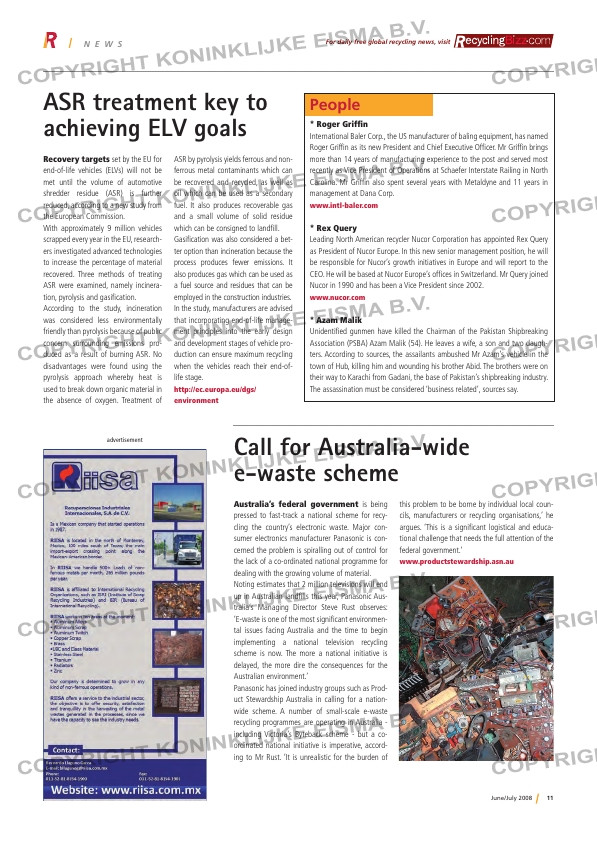Page 11 from: June / July 2008

11June/July 2008
For daily free global recycling news, visit N E W S
advertisement
People
* Roger Griffin
International Baler Corp., the US manufacturer of baling equipment, has named
Roger Griffin as its new President and Chief Executive Officer. Mr Griffin brings
more than 14 years of manufacturing experience to the post and served most
recently as Vice President of Operations at Schaefer Interstate Railing in North
Carolina. Mr Griffin also spent several years with Metaldyne and 11 years in
management at Dana Corp.
www.intl-baler.com
* Rex Query
Leading North American recycler Nucor Corporation has appointed Rex Query
as President of Nucor Europe. In this new senior management position, he will
be responsible for Nucor’s growth initiatives in Europe and will report to the
CEO. He will be based at Nucor Europe’s offices in Switzerland. Mr Query joined
Nucor in 1990 and has been a Vice President since 2002.
www.nucor.com
* Azam Malik
Unidentified gunmen have killed the Chairman of the Pakistan Shipbreaking
Association (PSBA) Azam Malik (54). He leaves a wife, a son and two daugh-
ters. According to sources, the assailants ambushed Mr Azam’s vehicle in the
town of Hub, killing him and wounding his brother Abid. The brothers were on
their way to Karachi from Gadani, the base of Pakistan’s shipbreaking industry.
The assassination must be considered ‘business related’, sources say.
Call for Australia-wide
e-waste scheme
Australia’s federal government is being
pressed to fast-track a national scheme for recy-
cling the country’s electronic waste. Major con-
sumer electronics manufacturer Panasonic is con-
cerned the problem is spiralling out of control for
the lack of a co-ordinated national programme for
dealing with the growing volume of material.
Noting estimates that 2 million televisions will end
up in Australian landfills this year, Panasonic Aus-
tralia’s Managing Director Steve Rust observes:
‘E-waste is one of the most significant environmen-
tal issues facing Australia and the time to begin
implementing a national television recycling
scheme is now. The more a national initiative is
delayed, the more dire the consequences for the
Australian environment.’
Panasonic has joined industry groups such as Prod-
uct Stewardship Australia in calling for a nation-
wide scheme. A number of small-scale e-waste
recycling programmes are operating in Australia –
including Victoria’s Byteback scheme – but a co-
ordinated national initiative is imperative, accord-
ing to Mr Rust. ‘It is unrealistic for the burden of
this problem to be borne by individual local coun-
cils, manufacturers or recycling organisations,’ he
argues. ‘This is a significant logistical and educa-
tional challenge that needs the full attention of the
federal government.’
www.productstewardship.asn.au
Recovery targets set by the EU for
end-of-life vehicles (ELVs) will not be
met until the volume of automotive
shredder residue (ASR) is further
reduced, according to a new study from
the European Commission.
With approximately 9 million vehicles
scrapped every year in the EU, research-
ers investigated advanced technologies
to increase the percentage of material
recovered. Three methods of treating
ASR were examined, namely incinera-
tion, pyrolysis and gasification.
According to the study, incineration
was considered less environmentally
friendly than pyrolysis because of public
concern surrounding emissions pro-
duced as a result of burning ASR. No
disadvantages were found using the
pyrolysis approach whereby heat is
used to break down organic material in
the absence of oxygen. Treatment of
ASR by pyrolysis yields ferrous and non-
ferrous metal contaminants which can
be recovered and recycled, as well as
oil which can be used as a secondary
fuel. It also produces recoverable gas
and a small volume of solid residue
which can be consigned to landfill.
Gasification was also considered a bet-
ter option than incineration because the
process produces fewer emissions. It
also produces gas which can be used as
a fuel source and residues that can be
employed in the construction industries.
In the study, manufacturers are advised
that incorporating end-of-life manage-
ment principles into the early design
and development stages of vehicle pro-
duction can ensure maximum recycling
when the vehicles reach their end-of-
life stage.
https://ec.europa.eu/dgs/
environment
ASR treatment key to
achieving ELV goals
RI_029_NEWS.indd 11 19-06-2008 14:41:14



